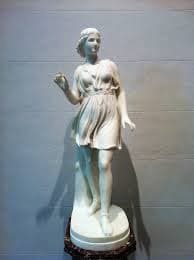
Atalanta
The King of Arcadia had no use for female offspring, and when his daughter Atalanta was born, he ordered her abandoned in the wilderness. Luckily for Atalanta, a mother bear took on the human cub and the girl grew up to be a shy and swift forest creature. One day she was seen by a group of hunters who adopted her, and in time she became a great huntress. Atalanta becomes a dedicated follower of Artemis, and was determined to remain a virgin. As her beauty grew, all manner of male creatures tried to have their way with her, but she swiftly killed them all. She famously slew the Calydonian Boar, and suddenly her father was eager to reunite with his daughter. She agreed to return home, but under the condition that she could remain a virgin. But the stream of suitors was never ending, and eventually Atalanta reluctantly agreed that she would marry the man who could outrun her in a race, but that any loser would be killed. A good many young men lost their lives, but then Hippomenes came along and he asked the goddess Aphrodite for assistance. She was the goddess of love, and clearly not a big fan of virgins. She gave Hippomenes three irresistible golden apples, which he dropped strategically during the race for Atalanta to pick up. He won the race, and they got married. However, he forgot to thank Aphrodite for her help and she tricked them into having sex in the temple of Zeus. Zeus was not amused and turned them both into lions, so they could never mate again.
George Frideric Handel: Atalanta, HWV 35 (Katalin Farkas, soprano; Eva Lax, contralto; János Bándi, tenor; Jozsef Gregor, bass; László Polgár, bass; Savaria Vocal Ensemble; Capella Savaria; Nicholas McGegan, cond.)
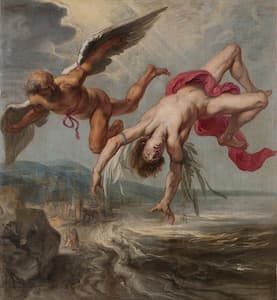
Jacob Peter Gowy: The Flight of Icarus
Most people knows the story of Icarus, who escaped imprisonment by building a contraption that allowed him to take flight. And as we all know, he flies too close to the sun and the flying machine melts away, with Icarus plunging to his death. So far so good, but what actually led to the death of Icarus is one of the most twisted stories in Greek mythology. King Minos of Crete employed Icarus’ father Daedalus, and asked him to build an enclosure for the Minotaur, a creature with the body of a man and the head and tail of a bull. In truth, the Minotaur was actually the son of Pasiphae, Minos’ wife. You see, Minos had offended Poseidon, the god of the sea, and he in turn avenged himself by cursing Pasiphae to fall in love with a snow-white bull. So Pasiphae asked Daedalus to construct for her a hollow wooden cow, and the bizarre union between Pasiphae and the bull resulted in the Minotaur. The Minotaur was a gigantic and violent creature, so Minos asked Daedalus to build a labyrinth for the beast from which there was no escape. The Minotaur lived at the center of the labyrinth and was fed with human sacrifices. In order to prevent Daedalus and Icarus from divulging the secret of the labyrinth to anyone, he imprisoned them atop the highest tower of the city. And that’s where Daedalus and Icarus come up with the idea of taking flight.
Sergei Slonimsky: Icarus Suite (Duo Petrof)
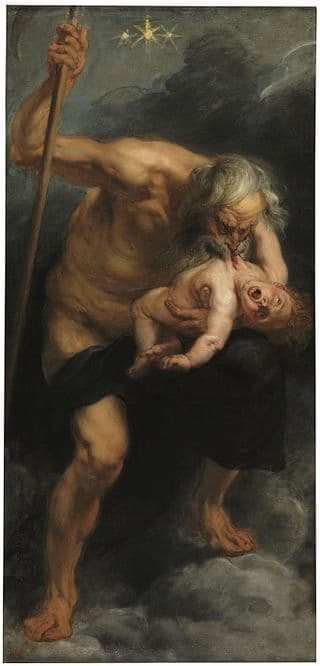
Peter Paul Rubens: Saturn Devouring His Son
Kronos, sometimes also written as Cronus or Cronos, was the divine descendant of Uranus the sky, and Gaia the Earth. He was the King of the Titans, the second generation of divine beings worshiped by Ancient Greek religion. He ruled the cosmos together with his sister-wife Rhea during the Golden Age, but only after he had castrated and deposed of his father Uranus. Kronos lived in constant fear of a prophecy that his own son would in turn overthrow him. Kronos and Rhea sired five gods, Demeter, Hestia, Hera, Hades and Poseidon, but in fear of the prophecy he swallowed each of his children as they were born. However, Rhea managed to save the youngest god Zeus, by hiding him on the island of Crete. Once Zeus had come of age, he forced Kronos to disgorge his swallowed offspring, and led the Olympians in a ten-year war against the Titans, eventually driving them in defeat into the pit of Tartarus. Kronos was known as the god of time, in particular time when viewed as a destructive and all-devouring force. And that’s exactly how Goethe and Schubert portray him.
Franz Schubert: “An Schwager Kronos,” (Coachman Kronos) Op. 19, No. 1, D. 369 (Hermann Prey, baritone; Karl Engel, piano)
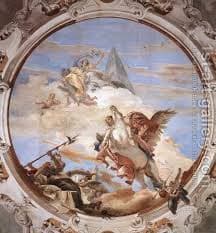
Giovanni Battista Tiepolo: Bellerophon on Pegasus
The mythical winged horse Pegasus is surely one of the most recognized creatures in Greek mythology. Pegasus is the offspring of the Olympian god Poseidon, and he emerged from the blood issuing from Medusa’s neck as Perseus was beheading her. This mysterious creature was capable of everything, symbolizing divine inspiration and the journey to heaven. It goes without saying that somebody wanted to tame and ride this fabled creature. And that particular pleasure fell onto the hero Bellerophon, who was possibly sired by Poseidon. His dotting mother spoiled Bellerophon rotten, and from the moment he laid eyes on the winged horse, it became his obsession. But every time he got close to Pegasus, the horse bucked and bolted into the air before Bellerophon could even touch it. It was clear that he needed the help of the gods if he were to tame and ride Pegasus. And he did get help from Athena, who gave him a golden bridle, which Bellerophon used to domesticate the creature. Together they defeated the “Chimera,” a monstrous fire-breathing creature composed of the parts of more than one animal. It had the body of a lion with the head of a goat protruding from its back and a tail that ended in a snakehead. Full of confidence, Bellerophon attempted to fly up to the heavens, but such folly generally ends in tragedy. And sure enough, he was thrown from Pegasus in midair. Although he survived the fall, he was paralyzed for the rest of his life. Pegasus, on the other hand, was transformed into a star constellation by almighty Zeus.
William Bolcom: 9 Bagatelles, “Pegasus” (Jon Nakamatsu, piano)
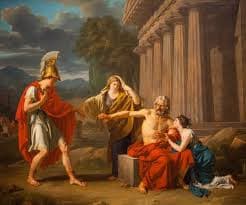
Jean Antoine Théodore Giroust: Oedipus at Colonus
Oedipus must surely be one of the most notorious names in Greek Mythology. According to legend he unwittingly killed his father and married his mother. And when the truth of the relationship became known, Oedipus’ wife and mother, having given birth to her son’s four children, hanged herself. You may well ask how such an unfortunate story came into being. Well, the oracle warned the King of Thebes that his son would slay him. When his wife Jocasta bore him a son, he abandoned the baby in the wilderness. However, a shepherd took pity on the infant who was subsequently adopted by the King of Corinth and his wife. When Oedipus had grown into a young man, he visited the oracle and learned that he was fated to kill his father and marry his mother. Horrified, he resolved never to return to Corinth and instead made his way into Thebes. Oedipus immediately got into a fight with his real father, and killed him. At that time, a Sphinx plagues Thebes, but Oedipus outwitted the beast and was rewarded with the throne of Thebes and the hand of the widowed queen, his mother Jocasta. Once the truth comes out, however, Jocasta committed suicide and Oedipus, after blinding himself went into exile. Oedipus died at Colonus near Athens, and he was swallowed into the earth to become a guardian hero of the land.
Felix Mendelssohn: Oedipus at Colonus, Op. 93 (Otto Sander, vocals; Therese Hamer, vocals; Franziska Pigulla, vocals; Klaus Piontek, vocals; Wolfgang Unterzaucher, vocals; Gunther Schoss, vocals; René Pape, bass; Berlin Radio Chorus; Carl Maria von Weber Men’s Choir, Berlin; Berlin Radio Symphony Orchestra; Stefan Soltész, cond.)
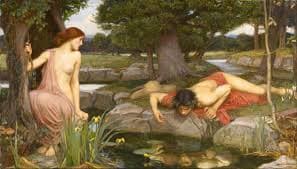
John William Waterhouse: Echo and Narcissus
To conclude our little excursion into the world of Greek Mythology, here comes a story of immediate relevance for all selfie enthusiasts. Narcissus was the son of the river god Cephissus and the nymph Liriope. And he was the most handsome and beautiful of all men, and nobody could resist him. The problem was that Narcissus was so deeply in love with himself, or better yet with the image of himself, that he showed nothing but distain and contempt for his admirers. Once when he was walking in the woods the mountain nymph Echo spotted him, and she immediately fell in love. When she tried to hug him, however, he roughly pushed her aside and told her not to disturb him. Nemesis, the goddess of retribution and revenge was not at all happy and decided to punish Narcissus for his behavior. On a hot summer’s day, the goddess lured Narcissus to a pool of water and when he looked in the water he saw his reflection immediately fell in love with it. When he finally understood that it was just a reflection and that he would never be able to possess such beauty, he committed suicide. I am sure there is a lesson somewhere in this story. In any event, Narcissus also lent his name to a class of mental inflictions classified as a personality disorder.
For more of the best in classical music, sign up to our E-Newsletter
Karol Szymanowski: Myths, Op. 30, No. 2 “Narcissus” (Eeva Koskinen, violin; Juhani Lagerspetz, piano)


